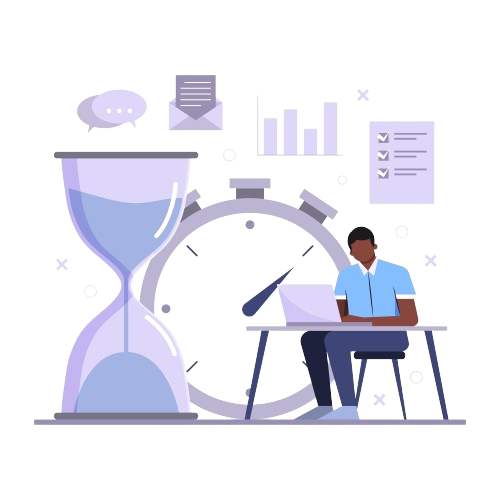In today’s fast-paced work environment, achieving a healthy work-life balance can feel like a constant juggling act. With flexible work arrangements becoming more common, balancing professional responsibilities and personal life is crucial for both well-being and productivity. Fortunately, time tracking software offers a powerful solution to this challenge. This software enables employees and managers to monitor hours, manage tasks, and streamline productivity—all essential factors for achieving work-life balance. Here, we’ll dive into the time tracking benefits that can help you regain control over your time and improve your overall quality of life.
Understanding Time Tracking Software and Work-Life Balance
Time tracking software is designed to monitor how much time you spend on various tasks throughout the day. It can automatically log hours, track project progress, and even help you manage deadlines more effectively. By visualizing your day in terms of time, you can make better decisions about which activities to prioritize and when to take breaks.
In remote and hybrid settings, time tracking software provides essential data to maintain productivity while respecting personal time, promoting a balanced approach to work.
Top Time Tracking Benefits for Work-Life Balance
Let’s explore the key ways in which time tracking can support a balanced lifestyle:
- Optimized Time Management
One of the biggest time tracking benefits is how it enables efficient time management. Knowing how your time is allocated each day can help you identify your peak productivity hours and optimize your schedule accordingly.
- Prioritize High-Value Activities: Time tracking lets you focus on tasks that contribute the most to your goals. By understanding where your time goes, you can shift your energy to high-impact activities.
- Reduce Wasted Time: Identifying time-wasting activities allows you to make adjustments and concentrate on meaningful tasks. As a result, you’re likely to finish work within reasonable hours, creating more personal time.
- Reduced Stress and Burnout
Time tracking software helps prevent overworking by setting clear boundaries around work hours. Without tracking, you may find yourself working late into the night or on weekends, which can lead to burnout.
- Clear Work Hours: When you’re aware of how much time you’ve already spent working, you can take breaks and stop at reasonable hours. This boundary prevents the mental and physical exhaustion associated with extended work hours.
- Effective Break Planning: Knowing when you’ve worked a full stretch allows you to take regular, mindful breaks, which boosts both productivity and mental clarity.
- Enhanced Productivity and Efficiency
Monitoring your time can have a significant impact on productivity. By tracking which hours are the most productive, you can structure your day to maximize efficiency.
- Track Productive and Unproductive Hours: Many time tracking tools offer analytics to see when you’re most productive. Using this information, you can allocate challenging tasks to your peak hours, leading to quicker and higher-quality results.
- Visual Progress and Motivation: Seeing your progress in real-time boosts motivation and gives you a sense of accomplishment, making it easier to finish tasks without feeling overwhelmed.
- Flexibility and Autonomy
One of the most appealing aspects of time tracking software is the flexibility it provides. With clear visibility into work hours, employees can tailor their schedules to fit both personal and professional needs.
- Empowers Work on Your Schedule: By tracking hours flexibly, you can adjust your workday based on personal priorities, ensuring that work doesn’t interfere with personal life.
- Balance Commitments: For those balancing work with family or other responsibilities, time tracking offers a structured way to balance commitments without compromising either aspect.
How Time Tracking Enhances Communication and Collaboration
Transparent time tracking strengthens communication and collaboration within teams, contributing to a more harmonious and productive work environment.
- Transparency Among Team Members: When everyone logs their time, it fosters a sense of shared responsibility and transparency. Colleagues gain insight into each other’s workloads, making it easier to coordinate tasks and deadlines.
- Reduced Need for Micromanagement: Time tracking offers managers a clear view of progress without constant check-ins, allowing employees to work independently and reducing the pressure of micromanagement.
- Builds Trust and Cohesion: A culture of transparency encourages team members to support each other’s workloads, leading to improved morale and a greater sense of teamwork.
Implementing Time Tracking Software Effectively
While time tracking offers substantial benefits, using it effectively is key to ensuring a positive experience. Here are some practical tips:
- Set Clear Goals and Boundaries: Define why you’re tracking time and what you hope to accomplish. Make sure to set boundaries around personal time so that tracking doesn’t feel invasive.
- Encourage Regular Reviews: Analyze time tracking data periodically to identify areas for improvement. Whether it’s reallocating tasks or taking more breaks, make adjustments as needed to maintain a balanced workflow.
- Respect Work-Life Boundaries: Ensure that employees feel free to stop tracking after work hours, especially in remote work situations. Enforcing these boundaries shows respect for personal time and reinforces a healthier balance.
Conclusion
Time tracking software is a powerful tool for anyone looking to enhance work-life balance. By enabling better time management, reducing burnout, boosting productivity, and fostering flexible work habits, it empowers you to take control of your schedule. Time tracking benefits go beyond productivity—they provide insights that help you create a balanced life where both work and personal well-being thrive.
If you’re seeking ways to enhance productivity and achieve a healthier work-life balance, consider adopting time tracking software as a step towards more efficient and satisfying workdays.



